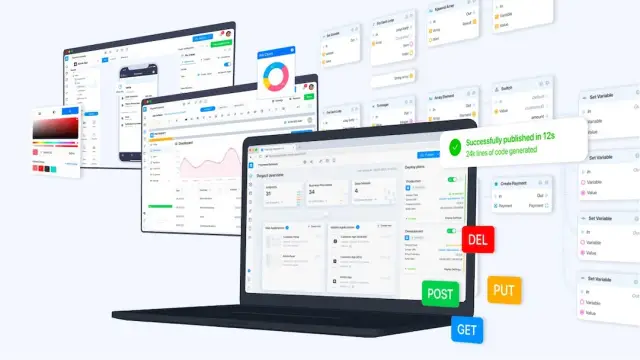The Complete Guide to E-Commerce Personalization
Discover the ins and outs of e-commerce personalization with this extensive guide, which covers strategies, tools, and best practices for optimizing your online store for customer satisfaction.

What is E-Commerce Personalization?
E-commerce personalization is tailoring an online store's content, product recommendations, and shopping experience to suit each customer's preferences, behavior, and past purchases. The primary goal of personalization is to create an engaging, unique, and relevant shopping journey that caters to a user's specific needs and wants.
By leveraging data insights, advanced analytics, and machine learning algorithms, e-commerce businesses can deliver a highly personalized experience, making customers feel valued and understood. This targeted approach enhances customer satisfaction, loyalty, and higher conversion rates.
Why Personalization Matters in the E-Commerce Industry
In an increasingly competitive digital marketplace, the importance of e-commerce personalization cannot be overstated. Personalized shopping experiences help businesses stand out from their competitors and lead to more satisfied customers and better sales performance. Here are a few reasons why personalization matters in the e-commerce industry:
- Increased Conversions: A personalized shopping experience is more likely to resonate with and engage potential customers. By presenting relevant content and product recommendations based on user behavior, businesses can entice customers to purchase, significantly boosting conversion rates.
- Enhanced Customer Loyalty: When customers feel their unique preferences are being catered to, they develop a strong affinity for that brand. Personalization fosters loyalty by ensuring customers have a memorable and relevant shopping experience, making them more inclined to return for future purchases.
- Higher Average Order Values: Personalized product recommendations naturally increase cross-selling and upselling opportunities, resulting in higher average order values. By offering complementary products or suggesting higher-value alternatives based on users' preferences, businesses can motivate customers to spend more.
- Improved Customer Retention: A personalized customer journey helps reduce cart abandonment and foster long-term relationships. When customers receive individualized attention, they are less likely to explore alternative options, consequently leading to improved retention rates.
- Enhanced Customer Satisfaction: Offering a seamless, tailored experience makes customers feel valued, resulting in higher satisfaction rates. This leads to repeat purchases and helps generate positive word-of-mouth marketing.
Key Strategies and Tactics for E-Commerce Personalization
Implementing e-commerce personalization requires a combination of data-driven insights, innovative tools, and well-planned strategies. Here are a few key tactics to kickstart your e-commerce personalization efforts:
- Personalized Product Recommendations: Analyze users' browsing behavior, search queries, and past purchases to recommend products that match their interests. Using machine learning algorithms and collaborative filtering, offer curated product suggestions that cater to individual preferences.
- Dynamic Content: Present personalized content, such as banners, promotions, and blog entries, based on a user's preferences, location, purchase history, and browsing behavior. By tailoring your content, you can capture your audience's attention and provide a highly relevant experience.
- Triggered Emails: Send automated, personalized email messages based on specific customer actions, such as cart abandonment, product views, or previous purchases. These targeted email campaigns increase the likelihood of re-engagement and conversions.
- Personalized Search: Optimize your website's search functionality by incorporating user-specific data, like browsing history and personal preferences, to present tailored and more relevant search results. This ensures customers can quickly find the products they're looking for.
- Customized Navigation: Tailor your website's navigation menu based on individual customer preferences and browsing behavior. This helps customers get a personalized experience, making it easier for them to discover and shop for items they'd be interested in.
Implementing these strategies requires a powerful set of tools and technologies, which will be covered in the subsequent sections of this guide. Effective e-commerce personalization is an ongoing process, and continuous experimentation, optimization, and adaptation are key to success.

Tools and Technologies for E-Commerce Personalization
E-commerce personalization relies on various tools and technologies to collect and analyze customer data, discover patterns, and build relevant, targeted experiences. Implementing personalization requires a combination of these solutions to achieve the best results. Here are some essential tools and technologies to consider:
Customer Data Platforms (CDPs)
CDPs collect and centralize customer data from multiple sources, providing the basis for personalization. They track customer interactions and store information such as browsing behavior, purchase history, and demographic details. CDPs enable businesses to segment their audience and customize marketing campaigns, triggered emails, product recommendations, and more. Examples of popular CDPs include Segment, BlueConic, and Optimizely.
Artificial Intelligence (AI) and Machine Learning (ML)
AI and ML play a significant role in e-commerce personalization. These technologies analyze large volumes of data to find patterns and predict user preferences, helping online stores offer tailored recommendations and experiences. Many personalization engines use AI and ML algorithms to facilitate targeted marketing activities and improve the effectiveness of e-commerce personalization strategies.
No-Code Platforms
No-code platforms, such as AppMaster, simplify the process of customizing your online store and automating workflows. These platforms help businesses create and manage personalized experiences without needing advanced technical skills. Using a no-code platform can save time, reduce costs, and support rapid e-commerce growth as they can be easily scaled according to your business needs.
Third-Party Personalization Engines
Third-party personalization engines offer ready-to-use personalization solutions that can be easily integrated into e-commerce platforms. These tools provide recommendations, dynamic content, and personalized promotions by analyzing customer data, enabling online retailers to enhance their personalization efforts. Examples of third-party personalization engines include Nosto, Emarsys, Monetate, and RichRelevance.
Best Practices to Implement Personalization in Online Retail
Implementing e-commerce personalization effectively can increase customer satisfaction and drive better business results. Here are some best practices to consider when adopting personalization strategies:
Prioritize Data Collection and Analysis
Data is the foundation of any e-commerce personalization strategy. Ensure your business collects relevant customer data from different sources, such as website analytics, social media interactions, and customer support requests. Analyze the data to identify user preferences and habits, and then use this information to create targeted offers and recommendations that meet individual customer requirements.
Segment Your Audience
Dividing your customer base into smaller segments based on demographics, browsing behavior, and purchase history is crucial for effective personalization. When you understand what different audience segments want, you can tailor your marketing efforts and recommendations to cater to their specific needs. This increases relevance and improves the customer experience.
Conduct A/B Testing
A/B testing allows you to compare different variations of your personalization strategies to determine which yield the highest conversion rates, sales, or customer engagement. By testing different versions of personalized content, recommendations, or triggers, you can refine your approaches to maximize the effectiveness of your e-commerce personalization efforts.
Ensure a Seamless Omnichannel Experience
Customers interact with businesses across various channels, such as mobile apps, social media, email, and websites. To provide a seamless and consistent experience, ensure that your personalization efforts extend across all channels. Create an omnichannel strategy to reach customers at different touchpoints, delivering tailored content that enhances their shopping journey.
AppMaster for E-Commerce Personalization
AppMaster is a powerful no-code platform that can help businesses achieve e-commerce personalization with minimal effort. By providing a comprehensive solution for creating backend, web, and mobile applications without writing code, AppMaster makes it easy for retailers to implement and manage personalization strategies.
Here are some ways AppMaster can help your e-commerce business with personalization:
- Customized store design: With AppMaster's easy-to-use drag-and-drop interface, you can create a unique e-commerce store that caters to your target audience. Customize page layouts, navigation, and UI elements for a personalized user experience.
- Integration with existing systems: AppMaster supports seamless integration with various data sources and tools, allowing you to bring together customer information and personalize your e-commerce store according to user preferences. Data collected from your website can be used to deliver targeted product recommendations, promotions, and content.
- Automated workflows: Creating automated workflows with AppMaster lets you streamline your marketing efforts and deliver personalized experiences at scale. Trigger relevant email campaigns, push notifications, or SMS messages based on user behavior to maintain customer engagement.
- Scalability: The AppMaster platform is designed to support e-commerce businesses of all sizes. As your personalization strategies evolve and your business grows, AppMaster can scale seamlessly to accommodate your changing requirements.
By leveraging the power of AppMaster, you can enhance your e-commerce personalization efforts, drive customer satisfaction, and positively impact your online store's performance.

Measuring the Impact of E-Commerce Personalization
Evaluating the effectiveness of your e-commerce personalization efforts is essential for identifying areas of improvement, optimizing strategies, and maximizing return on investment (ROI). To assess the impact of personalization, focus on several key performance indicators (KPIs) that can provide valuable insights into the performance of your online store.
Conversion Rate
One of the primary goals of personalization is to increase the conversion rate of your online store by providing a tailored shopping experience for customers. To measure the impact of your personalization efforts on conversion rates, compare the conversion rates of personalized pages or campaigns with non-personalized alternatives. An increase in conversion rates after implementing personalization indicates a positive influence on customer behavior.
Average Order Value (AOV)
Personalization strategies often focus on increasing the average order value by suggesting products that complement the customer's preferences or previous purchases. Track the AOV before and after implementing personalization to gauge its effectiveness. A higher AOV after personalization signifies that customers are more likely to add additional items to their carts, increasing revenue for your e-commerce business.
Customer Retention and Repeat Purchases
Effective personalization can strengthen customer relationships, increasing customer retention and repeat purchases. Compare the retention rates and frequency of repeat purchases before and after personalization to evaluate its impact. Higher retention rates and more repeat purchases indicate that customers are satisfied with their personalized shopping experience and are more likely to become loyal customers.
Revenue Per User (RPU)
Measuring the revenue generated per user is vital in understanding the effectiveness of your personalization efforts. A higher RPU indicates that your personalization strategies successfully influence customers to spend more, leading to increased revenue for your e-commerce store.
Customer Satisfaction Scores
Customer satisfaction is crucial in the e-commerce industry as it directly impacts your online store's reputation and profitability. To measure the impact of personalization on customer satisfaction, analyze satisfaction scores such as Net Promoter Score (NPS), Customer Satisfaction Score (CSAT), or Customer Effort Score (CES). Improved satisfaction scores after implementing personalization demonstrate that customers appreciate the customized shopping experience and are more likely to recommend your online store to others.
The Future of E-Commerce Personalization
The e-commerce personalization sphere continuously evolves, driven by technological advancements, customer expectations, and industry trends. To stay ahead of the competition, keep an eye on the following future trends in e-commerce personalization:
AI-Driven Personalization
Artificial intelligence (AI) and machine learning are making strides in the e-commerce industry, enabling businesses to deliver more personalized and relevant experiences. Advanced AI algorithms are helping retailers analyze customer data more accurately, understand customer behavior better, and provide real-time personalization. AI-driven personalization will continue to grow, helping e-commerce businesses create more engaging customer experiences and increase conversions.
Voice and Visual Search
As consumers increasingly rely on voice assistants and smartphones for shopping, e-commerce businesses will need to adapt their personalization strategies accordingly. Voice and visual search capabilities will become more prevalent, enabling customers to find products that match their preferences quickly. Personalization must extend beyond on-site experiences to facilitate seamless voice and visual search results tailored to individual customers.
Virtual Reality Shopping Experiences
Virtual reality (VR) technology is gaining traction in e-commerce, bringing customers immersive shopping experiences. In the future, personalization may involve creating VR-enabled online stores, where customers can experience products in a realistic environment tailored to their preferences. This could revolutionize how customers shop online, further elevating the need for e-commerce personalization.
Increased Focus on Customer Privacy and Personal Data Management
As data privacy regulations evolve, e-commerce businesses must maintain customer trust while delivering personalized experiences. In the future, online retailers must balance personalization and privacy by being more transparent in their data collection practices and providing customers with better control over their personal information. This approach will be key to maintaining strong customer relationships and continued success in e-commerce personalization.
E-commerce personalization will continue to play a significant role in the success of online retailers. Staying informed about emerging trends and adapting your personalization strategies will enhance your online store's performance and maximize customer satisfaction. Implementing the right tools, such as AppMaster, can help you stay ahead of industry trends and provide a tailored shopping experience that keeps your customers returning for more.
FAQ
E-commerce personalization is the process of customizing an online store's content, product recommendations, and overall shopping experience according to each individual user's preferences, behavior, and past purchases.
Personalization helps online retailers create a tailored shopping experience, increasing customer satisfaction, loyalty, and ultimately boosting sales and conversions.
Strategies include personalized product recommendations, dynamic content, triggered emails, personalized search, and customized navigation.
Tools include customer data platforms (CDPs), artificial intelligence (AI) and machine learning algorithms, no-code platforms like AppMaster, and third-party personalization engines.
Best practices include prioritizing data collection, segmenting your audience, conducting A/B testing, and ensuring a seamless omnichannel experience for customers.
AppMaster is a powerful no-code platform that helps you customize your e-commerce store, automate workflows, and integrate with other tools to enhance personalization.
Metrics to track include conversion rate, average order value, customer retention, revenue per user, and customer satisfaction scores.
Future trends include AI-driven personalization, voice and visual search, virtual reality shopping experiences, and increased focus on customer privacy and personal data management.





